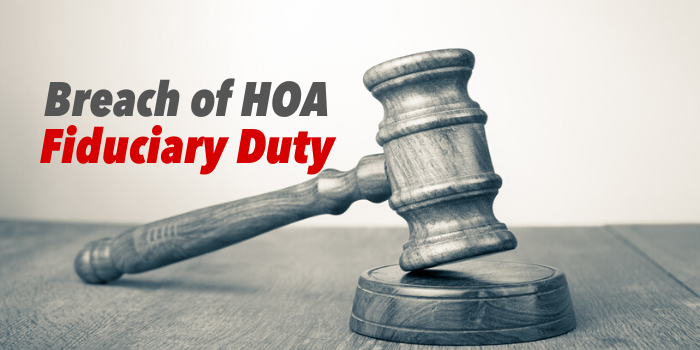Most boards we work with want to do a great job and have volunteered to help their community. But serving comes with some responsibility too. Why are a board’s duties so important and when have they been breached?
A board member’s duties fall under three basic components: the duty of care, the duty of loyalty, and the duty to act within the scope of its authority:
Duty of Care
A board member must take care to make informed decisions on behalf of association members. A fiduciary breach in this area most commonly occurs when a board fails to enforce rules and regulations within their governing documents, fails to conduct needed inquires before investing community funds into a costly project, or failed to properly budget and plan for the current needs and future reserves of the association. In the case of Ravens Cove Townhomes, Inc. v. Knuppe Development Co., California courts ruled that the Board had breached its fiduciary duty by failing to establish and maintain a reserve fund for the association.
Duty of Loyalty
Board members are obligated to act in the interest of the association only, and not for personal gain, whether monetary or otherwise. For example, the board may be considered in breach of duty when they contract landscaping to family members, or when a board member with 5 cats participates in a board vote on whether to increase the allowed number of pets in a home.
Duty to Act within the Scope of Authority
This duty prohibits board members from taking action or making decisions on matters without the authority to do so, as granted by their state laws and the association’s governing documents.
What constitutes a breach of duty?
In terms of liability, the fiduciary duty can be a bit of a gray area. For board members, personal and association liability is their biggest risk if they neglect their duties. However, because they are volunteers, they may be protected through their insurance, should they make a mistake. Additionally, HOA bylaws and CC&Rs sometimes contain indemnifications to protect board members from financial loss in the event of a lawsuit.
This isn’t to say that a board member can get away with whatever they want, however. A breach in fiduciary duty may be proven when the board (as a whole, or individual member) purposefully abuses his or her power and very rarely will D&O insurance cover it. If you are a board member understand your duties, act accordingly, and you should have little to worry about.
Consequences
Being found in breach of fiduciary duty can yield unwanted consequences. Besides being held personally liable for losses sustained, board action that would otherwise benefit the community runs the risk of being struck down by a court when implemented as the result of a breach of duty.
Be Prepared
Such adverse outcomes can be avoided. HOA boards must be thoroughly vetted and well versed in their community’s bylaws and articles of incorporation, as well as their state’s HOA-specific laws and regulations. We suggest all boards complete HOA training to ensure they are properly prepared to successfully manage their communities.
Contact SpectrumAM today to ensure that your HOA is run efficiently and effectively, and visit our blog for valuable information and insights into HOA management.







